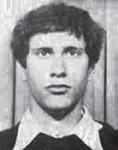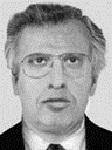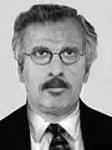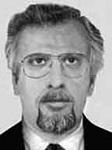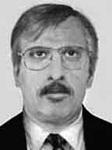SurrealisticSlumbers
Well-Known Member
- Joined
- Jul 18, 2015
- Messages
- 410
- Reaction score
- 869
LAWRENCE WILLIAM FISHMAN
Should be considered armed and dangerous.
Physical Description
Date of Birth: August 29, 1951 (he has also used August 29, 1947)
Place of Birth: Washington, DC
Sex: Male
Race: White
Hair: Brown
Eyes: Brown
Height: 5'11"
Weight: 160 lbs.
Distinguishing Marks/Features: Known to wear a mustache and/or beard.
Lawrence William Fishman, also known as Larry, was last seen in Silver Spring, Maryland, on November 28, 1980. His vehicle was found abandoned on December 3rd in Richmond, Virginia, in a city lot near the Trailways bus terminal, having sat there for two days, been ticketed, and finally impounded. It was a rented silver-blue Oldsmobile Cutlass with Massachusetts plates from Peabody, MA. Nothing was found inside the vehicle. He is wanted in connection with the murder of his father.
When Fishman called his parents to say he was coming home and wanted $100 to see "the best psychiatrist in the country," a flicker of hope ran through his mother's mind that the rift that had divided her family could somehow be mended. On November 28, 1980, "Larry," as he was known to family and friends, dropped in on his parents, Frederick, 60, and Evelyn Fishman, also 60, in their Silver Spring home. The $100 was laying on the table. It was suppertime, and, after speaking briefly to them, he shot his mother in the neck and his father in the back with a 9mm automatic pistol. Fred Fishman, a federal administrative judge in the Board of Land Appeals, called the police right after his wife had been shot, and then he himself was shot four times and was later pronounced dead at the hospital. His mother would recover from her wounds. Judge Fishman had spent almost 40 years in government service and had planned to retire a couple months later.
After the shooting, Fishman sped down the darkened street in his rented car, eventually making his way to Richmond, where he allegedly disposed of the murder weapon, abandoned the rental car, and then seemingly vanished into thin air. After a local arrest warrant was issued charging Fishman with murder, a complaint was filed in the United States District Court for the District of Maryland in Baltimore, on January 5, 1981, charging Fishman with unlawful flight to avoid prosecution. He has never been seen again.
Growing up in the suburbs of Silver Spring as the youngest of three, Larry Fishman was extraordinary, a quiet and solitary child who from his earliest days seemed inclined to tailor the world to his liking rather than to tailor himself to the world. "Larry didn't speak for the first four years of his life," his mother said. "When he finally did, his speech was garbled. He had his own vocabulary. He made up words. They were long marvelous words. They seemed to fit what he was saying better than real words." At age 6, Larry won chess matches against his father. Elementary school teachers told Mrs. Fishman that Larry was a genius - but where their older son Richard spilled his thoughts, Larry always reined his in. Evelyn Fishman, who worked for the Social Security Administration in Laurel, was the closer of the two parents to the children, but in the family's home, it was the father who set the tenor of life. Fred Fishman, as one friend remembers, was "king of his house," a blend of the stoic and the gregarious, the acerbic and the congenial. He mixed ambition, pride, self-respect and conservative politics with gregariousness and fatherly concern. Having been raised with the ethics of an Orthodox Jewish family, he donated to charities, helped job-seeking friends, and served on the board of his synagogue. He supported his kids long after they might have fended for themselves. A family friend mused, "He was very ambitious for his children. He wanted them to achieve."
It was the elder Fishman's persistent fear that the bottom might drop out from under his family, a fear that spurred him to work and save, and bid him to impress upon his children the importance of serious, well-paying jobs. And, it was the father's very different relationship with Larry, as opposed to the two other children, that began to upset the family tranquility. "There never was a smooth relationship between Larry and his father," Mrs. Fishman said. Though they did not always get on, Judge Fishman recognized that his son had a brilliant mind. During his youth, Fishman was treated for various mental disorders related to having a persecution complex. "He was hard to know, even for his parents," his mother said.
Fishman first went to college at the University of Maryland and in 1972 transferred to Berkeley, where he was a Phi Beta Kappa graduate. After he got his undergraduate degree in sociology, he then enrolled in graduate school and obtained his law degree from the Boalt Hall School of Law. In college, he was active in mental patient rights groups. One was called the "antipsychiatry movement," a loosely knit federation of dissident psychiatrists, libertarians, activists and ex-mental patients opposed to forced commitment to mental institutions. Two and three times a week, Larry attended meetings of a newly formed group of about 30 people called Network Against Psychiatric Assault, or Napa. The Napa meetings and Larry's participation in the movement in general, first in California, later in Philadelphia and other areas, were both a heart-felt cause and the source of his few close friendships. His interest in helping mental patients stemmed from this, and particularly from a summer he had spent in London in 1973 at an unorthodox treatment center where he researched a paper on alternate systems of mental patient care. He had never been a patient himself. But he felt patients who had been committed against their will were some of the most helpless victims of the psychiatric profession and the tyranny of the state.
Larry was notorious for stalking out of meetings if Napa members adopted an idea he had rejected. He cared even less for small talk then he did for psychiatrists. On the telephone he would hang up abruptly, call back five minutes later should another point occur to him, and then hang up again. Nonetheless, he made a couple of friends in Napa, and spent a year producing a radio show for KPFA on mental health issues. Napa had a grant to provide legal services for incarcerated mental patients, and Larry, who was living in Berkeley, worked as an advocate. He lectured college classes as a spokesman for a group called Committee Against Forced Treatment, and helped write language for California mental health regulations. These were not jobs that paid much if they paid anything at all. Larry lived off money his father mailed west each month. Judge Fishman was not shy in expressing contempt for work he felt inferior.
While living in California, Fishman expressed to a friend that his father was "bad for the family." Though he frequently criticized his father, he spent every dime he ever sent him. Fishman studied for the California bar, which he took and failed twice. "He couldn't get into it," said Bob Nicholson, a former friend and roommate. "His mind was on other things." Most of the day he sat around reading and watching soap operas on TV. When he broke the news to his parents, Larry blamed his unfamiliarity with water rights law for his poor showing on the bar exam. Nicholson recalled that whenever Larry phoned his parents he always spoke with his mother: "He made the claim to me that he thought his father was a bad guy. He didn't want anything to do with his father. He thought he was a hypocrite. He thought he was letting their house in Silver Spring run down, and that he was cheap for not fixing it." Still, his father supported him as he had when Larry was in school, sending him more than $200 a month.
As he moved from the purity of academic life to what he saw as the tainted realm of work and career, the contradictions of Larry Fishman's life grew starker. His friendship with Bob Nicholson ended one heated night, when Larry imagined that Bob was trying to kill him. "He would just build things up in his mind. I had a .22 pistol that we had shot target practice with, and Larry said, 'Give me the gun!' I said, 'What for, Larry?' He said he wanted me to prove I didn't want to kill him. I said, 'I don't want to kill you!' He wanted me to prove it. 'Where's the gun?' he said. So finally I said, 'It's over there in the cabinet.' He was lying on the bed and he jumped up and raced for the cabinet. I ran over to the chest where the gun really was and grabbed it. He was really angry. To satisfy him I gave him the bullets. I moved out the next morning."
The family was struck by tragedy two and a half years prior to the deadly shooting when Richard, the oldest, was killed. A strongly religious young man, he had decided to spend five weeks in Jerusalem to study Orthodox Judaism. Having only been there a week and a half, he was killed when a bomb planted by the Palestine Liberation Organization exploded on a bus he was on. He had only been 30. Richard's death was all the more devastating because the older son had been a force that drew the family together. "Dick was a good, steadying influence," Mrs. Fishman said. "He was wise and caring. He kept in touch with Larry. He wrote him and called him even though it was kind of a one-sided relationship. When he died, Larry felt a kind of anchor had been taken away."
A colleague of Judge Fishman believed there had been friction between father and son leading up to the events of that fateful evening in November. According to the colleague, the son had left the Washington area for Philadelphia after a big argument with his father. "Apparently they did not get along that well," said the colleague, who did not wish to be identified. After he'd moved to Philadelphia to work as a clerk for a Philadelphia judge, his mother received a phone call. Larry told her he was looking into enrolling at Yale, in a doctorate program in sociology. He also told her that he wanted to travel to Brazil to visit people. His mother explained to him that the family didn't have that kind of money and that they couldn't afford to just send him anywhere he wanted to go. Larry replied in an unpleasant voice, "You're very wealthy." He also asked her if she knew how the police department worked. After hanging up, she felt uneasy and worried about her son's mental state. Then, in November, the Fishmans received another call from him. He told his mother that he wanted to see a psychiatrist, and needed $100. Mrs. Fishman was very happy with this news, as she'd suggested on several occasions that he get help. Described as "troubled" by the Philadelphia judge for whom he worked, Larry straddled two worlds, sometimes playing the part of a Phi Beta Kappa law clerk, sometimes a hell-bent habitue of punk rock music clubs. He possessed a nature one woman described as "a combination of the angelic and the demonic."
Today, authorities say, they think Fishman's feelings of inadequacy and his preference for being alone probably make him a man with few friends -- seen by others as intellectually aloof. In addition to his work in law, advocacy, and research, Larry had also worked as cab driver and poet. Fishman has ties to Maryland, Virginia, Connecticut, Wisconsin, England, and Israel. He is reported to prefer warmer climates. Because Fishman attended undergraduate and graduate school at the University of California at Berkeley, FBI agents believe he could have traveled to the Bay Area after his father's murder. Indeed, when a nationwide television show, "America's Most Wanted," aired the story of Fishman, an anonymous caller said a man resembling Fishman frequented a 7-11 at 301 North Civic Drive in Walnut Creek. FBI agents showed Fishman's photo to store employees and learned that the Fishman look-alike came to the store in the afternoons to buy a soda and had been there two days before. Since the agents' visit, the man who looks like Fishman has never returned to the store.
Authorities were unable to ascertain whether or not Fishman had taken a bus after abandoning his car - if he had, he'd paid in cash. He might still be in the Richmond area, or back in Philadelphia. Police searched for him there, but found no trace of him or evidence of his return. The Fishmans' third child, a daughter, Ruth, now resides in California. Mrs. Fishman and Ruth were so afraid after the murder that they hired an armed guard to stand by while they packed up the house. Everything was put in storage, the family home was put up for sale, and Mrs. Fishman went into hiding. Larry Fishman remains at large.
Doe Network: http://www.doenetwork.org/cases/4880dmmd.html
Links to News Sites:
http://www.sfgate.com/news/article/New-Search-in-Bay-Area-for-Fugitive-in-Slayings-2980240.php
https://www.washingtonpost.com/archive/local/1980/11/29/us-official-shot-to-death-wife-injured-at-md-home/181ac02f-c3a1-482f-931f-4014e2646e0f/?utm_term=.6e4996abf6c7
https://www.washingtonpost.com/archive/politics/1981/04/26/an-american-familys-tragedy/582d33ae-5846-4ec9-bf7c-493a4c60c8fc/?utm_term=.ac9ab62127e6
https://www.washingtonpost.com/arch...f53-9b2f-40fc6d8fc55a/?utm_term=.f35a79abfa26
Book:
Murdered Judges: of the 20th Century and Other Mysterious Deaths by Susan P. Baker.
https://books.google.com/books?id=V...D#v=onepage&q=judge frederick fishman&f=false



